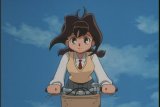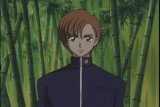

Quick Links:
Jubei-chan: Secret of the Lovely Eyepatch
I think the opening for Jubei-chan does a perfect job of capturing the essence of the series. In the background, a rousing, dramatic samurai theme is being played. But, on screen, instead of valorously dueling samurai, a young school girl is seen peddling back and forth on a bicycle. Welcome to the Nadesico of pulp samurai films…
Enter Scene 1. Japanese subtitles fly across the screen, as a shadowy historical drama unfolds in traditional samurai pulp fashion. 300 years ago, the head of the Yagyu-Shinkage school slowly worked to eliminate all its rival schools of the sword. The defeat of its final rival, the Ryujoji-Shinkage school, is shown on-screen in a dramatic duel between the head samurai of the two schools. Ultimately, the leader of the Yagyu-Shinkage school, Yagyu Jubei, triumphs, sealing the defeat of the Ryujoji clan, but old age claims the life of Jubei shortly thereafter. In his dying words, Jubei brandishes a “lovely eyepatch” and commands his disciple to search for a worthy successor to wear the eyepatch. The qualifications distinguishing this successor? “Bocha-bocha…purin-purin….bon-bon…..”
If the introduction animation hadn’t clued you in to the farcical nature of this anime, these final words would. All of the phrases uttered by Jubei are believable final words….and also onomatopeia words related to the bouncing or jiggling of pudding! Koinosuke, Jubei’s disciple, naturally takes these final, nonsensical words to heart and diligently searches the land for a successor who has these….pudding-like attributes. After 300 years, he finally comes upon a young lady whose bouncing female endowment seems to satisfy this mysterious description. He jumps forth from the bushes, brandishing the lovely eyepatch while launching into a lengthy description of the history of the eyepatch and the honor he is bestowing upon her….only to notice, on completion of his explanation, that she has left in the middle! Unfortunately for Koinosuke, his long-sought heroine is a bit reluctant to follow the traditional pulp samurai plot....
Thus begin the misadventures of Yagyu Jubei II…aka, Nanohana Jiyu, an ordinary eighth grade girl who has just moved into the neighborhood. The gags just keep coming and coming, as the creators poke fun at nearly every traditional aspect of a chanbara samurai flick. And, since Jubei-chan undergoes a transformation sequence, you can bet that there is plenty of play with the mahou shoujo genre, to boot. Nothing “traditional” is sacred in this comedy. Heck, they even managed to throw in a funny reference to Macross 7 to mix things up!
With more spoof than you can shake a shtick at, Jubei-chan is guaranteed to keep your funny-bone tickled. Furthermore, like all of the best comedy series, Jubei-chan also manages to touch on a number of personal problems in a serious, touching manner. The fact that the show can move so effectively between humorous moments to heart-breaking moments without diminishing the impact of either is a testament to the storytelling skill of Jubei-chan’s makers.
Moreover, the series manages to be just the right length - the 13 episode spread leaves more than enough time to tell the story, without suffering the doldrums of ennui which so often plague longer series or failing in the climax. The plot always keeps moving, and the potentially cheesier parts of the escalation get pulled off so masterfully that you won’t be left with questions like, “Cheddar or Swiss?” It’s especially ironic that a comedy like this could make trite and overused plot devices seem so fresh and polished.
An important part of the success of the shtick was capturing the mood of the stereotypes with the (Japanese) dialogue. For instance, Koinosuke’s polite confusion and frustration with the modern world is underscored by his use of the polite samurai speech forms. Shiro’s speech style is cool and composed, in accordance with his attempt at appearing formal and reserved. The speech style of the “Ruffians” is extremely rude and obnoxiously arrogant, doing a perfect job of rounding out these classic idiots….”full of sound and fury, signifying nothing.”
Rounding out the speech, the music and sound effects also played an important role in properly setting the scene, especially in the samurai spoof sections. The background music does an excellent job of setting up each genre as it is being taken advantage of in new and comedic ways. Even the ending song plays an important part in capturing the mix of hope and confusion of trying to find one’s identity in high school. The pieces may not be as strong in and of themselves, but they are all extremely well-matched to the context of the animation.
The animation itself may not be the most fluid, but it is quite stylistically appropriate and doesn’t disappoint. Indeed, effective use of exaggerated animation is an important part of some of the humor of the show, from how the Ruffians walk to Koinosuke's "breathing technique." In this respect, a lot of the power of the character designs comes more from how they animate than from the base design. The action scenes may seem a bit low-grade at times, but if you look carefully this is often done to simulate the stereotypical nature of a pulp samurai flick. The more important fight scenes are certainly more adequately animated, and do a good job of capturing the motion of the scenes, for a tv series.
All in all, Jubei-chan is a rollercoaster ride that doesn’t let up and finishes with a flourish. This is one of the best comedies in recent animation, and unless you’re green, furry, and live in a trash can on Sesame Street, there’s really no reason to pass it up. Pick it up now, and rejoice with Koinosuke over the completion of his 300 year mission…and the beginning of a comic clash of cliches!
Distributor: Bandai Creator: MADHOUSE Released: 1999
Plot: A Character Design: A Animation Quality: B Music: A- Overall: A



